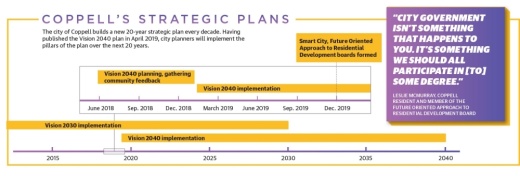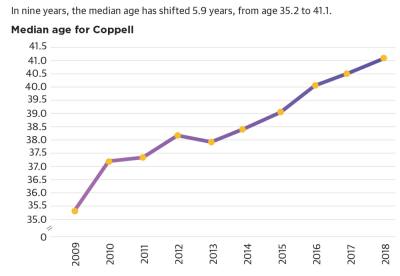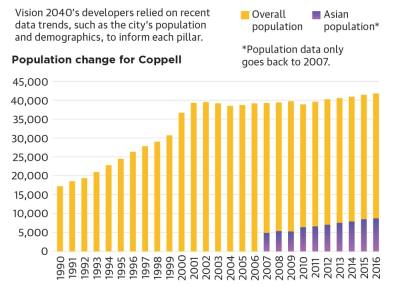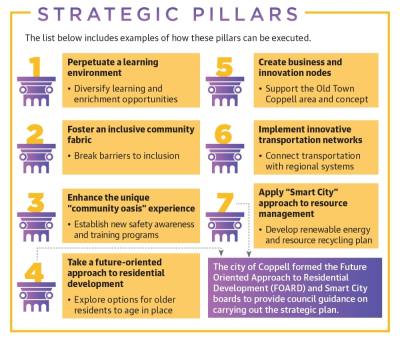Once a decade, the city of Coppell solicits resident feedback to help plan for the future of the largely suburban community. Staff published the latest iteration of its 20-year strategic plan, Vision 2040, in April 2019.
In November, the city created two new boards: Smart City and Future Oriented Approach to Residential Development. These boards are tasked with advising City Council on how best to prepare for technological advancements and on evaluating the city’s future housing needs, respectively.
Coppell Community Programs Manager Molly Bujanda said city officials wanted to ensure residents would continue to help shape Coppell.
“Those boards were created for two reasons,” she said. “[No.] 1 [was] to keep the community engaged in the implementation of [Vision 2040]. ... No. 2 was to further vet some of the big ideas that came up in the plan to make sure that [we are] moving forward with a community vision and not something that comes from staff alone.”
Vision 2040 is based on seven pillars, which were created based on feedback from more than 2,000 residents. The adoption of Vision 2040 and creation of the new city boards come as Coppell’s population is simultaneously increasing, growing older and becoming more ethnically diverse.
Smart City
The Smart City board will consider how modern technological advancements can be integrated into Coppell’s infrastructure. Part of its work will also include preparing for technology that does not yet exist, according to Jerod Anderson, Coppell’s director of enterprise solutions and the city liaison for the board.“How do we leverage new technology as it comes forward?” he asked. “Really, [the board is] geared towards what ... we need to do today to prepare for tomorrow.”
That preparation could include advising council on new cellular technology, Anderson said.
“Technology is going to change,” he said. “One of the goals is [preparing for] ... the smart infrastructure, ... so, you know, advising council, particularly on how the city could leverage 5G ... Maybe it’s 10G in 20 years.”
As outlined in the Vision 2040 plan, resource management and sustainability are key components of the board’s work. That includes setting Coppell up to be more self-reliant, such as through locally generating water, energy and food.
Though the Smart City board will provide recommendations to council on how the city can achieve these goals, it will not offer hard solutions, Anderson said.
“It’s not necessarily specifically looking for solutions related to smart cities,” Anderson said. “It’s more of an advisory.”
The board is just getting started in its new role, Anderson said. At its March 2 meeting, the board talked about establishing a definition of a “Smart City,” among other items.
Residential development board
The residential development board, meanwhile, has its sights set on one key Coppell demographic: seniors.“As stated by the council, ... their top priority is looking at senior housing,” said Leslie McMurray, Coppell resident and residential development board member.
Bujanda, the city’s community programs manager, said that focus is based on the public feedback gathered for Vision 2040.“We heard a lot from the community about aging in place and people wanting to stay rooted in this community,” she said.
That desire is echoed by planners in other nearby suburban communities: Longtime residents with large, empty houses are looking to downsize into homes that are easier to maintain.
“The reality is as people age—and if you’re in a big house [with] two stories, and your kids have gone off to college ... they may not want that big house to ricochet around in all the time,” McMurray said.
While the residential housing board will advise council on future senior housing pathways, Bujanda said she believes the city should also solicit feedback from younger generations.
“That board is [meant] to really include community members in that conversation to come up with some ideas that are more likely to be well-received by the community at large,” Bujanda said. “That includes the ... 55-plus age demographic that is looking to downsize, but it also includes ... their children, who are graduating from college and maybe wanting to come back and settle near family.”
Shaping Vision 2040
Coppell first began soliciting public feedback for its Vision 2040 strategic plan in June 2018, according to the city.Since Coppell puts out a new strategic plan every decade, Bujanda said residents will notice similarities between Vision 2030 and Vision 2040.
“If I were to really highlight the differences, I would say that we heard from the community that they’re more interested in leveraging the resources that we have rather than investing in new major capital projects, ... with the exception of transportation and technology,” she said.
Shifting demographics helped shape the Vision 2040 plan. Coppell’s population, for example, has more than doubled since the 1990s, and its Asian population has increased by nearly 70% since 2007, according to the plan. Fostering an inclusive community is one of Vision 2040’s pillars.
As the boards begin making recommendations on Coppell’s future, McMurray highlighted the importance of keeping the public involved.
“City government isn’t something that happens to you,” McMurray said. “It’s something we should all participate in [to] some degree.”
When inducting the boards’ new members at a Dec. 10 meeting, Coppell Mayor Karen Hunt expressed her gratitude for their volunteering.
“This is a new board [for] the city, so we are very thankful you guys stepped up,” Hunt said. “You get to ... trail-blaze.”









